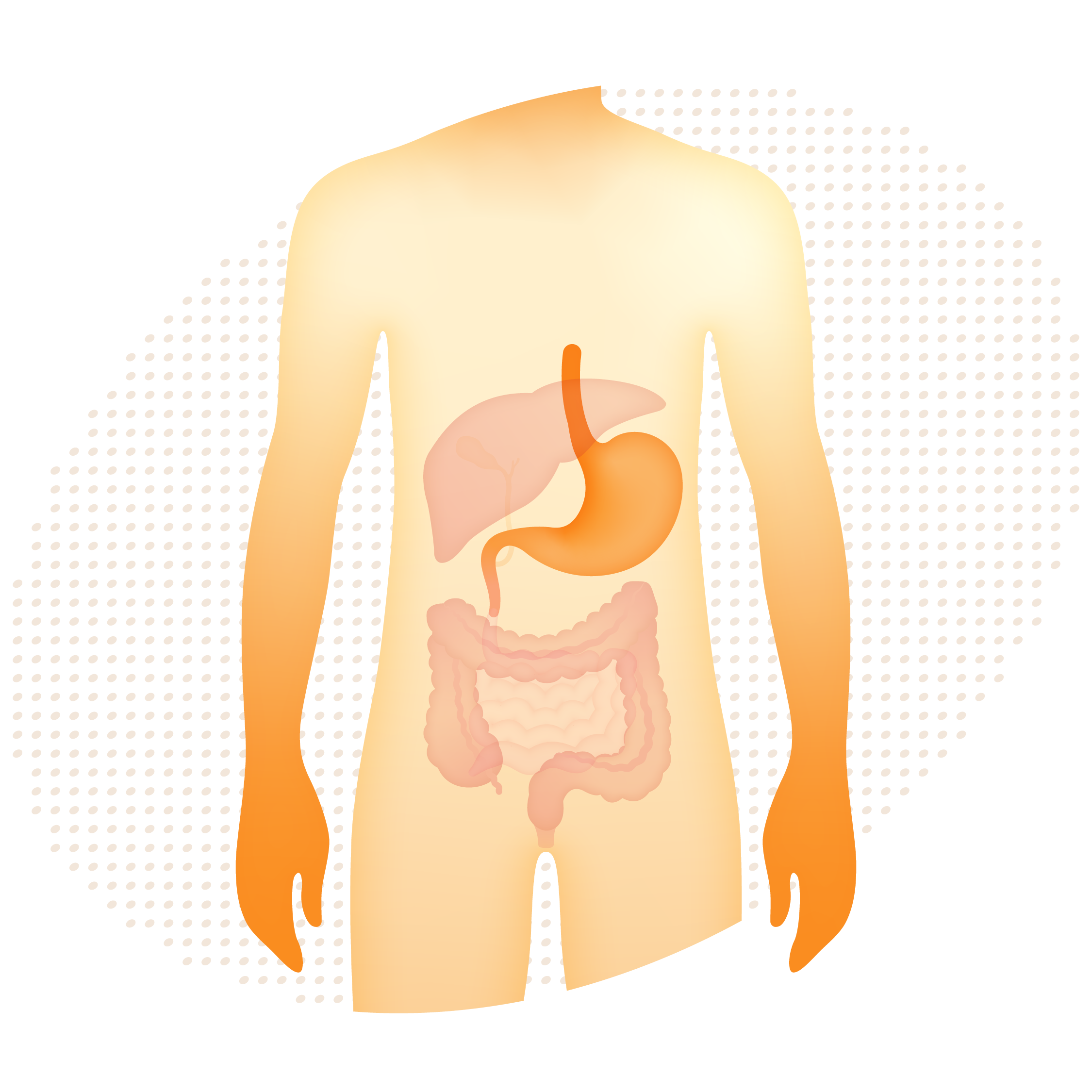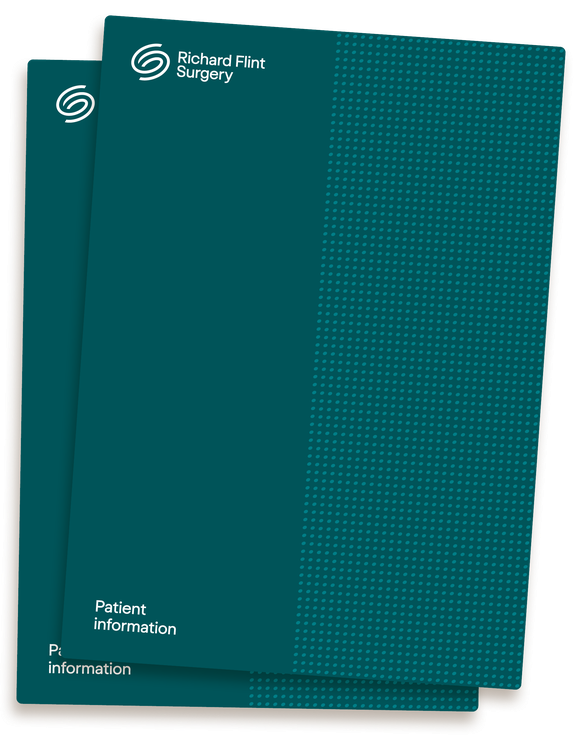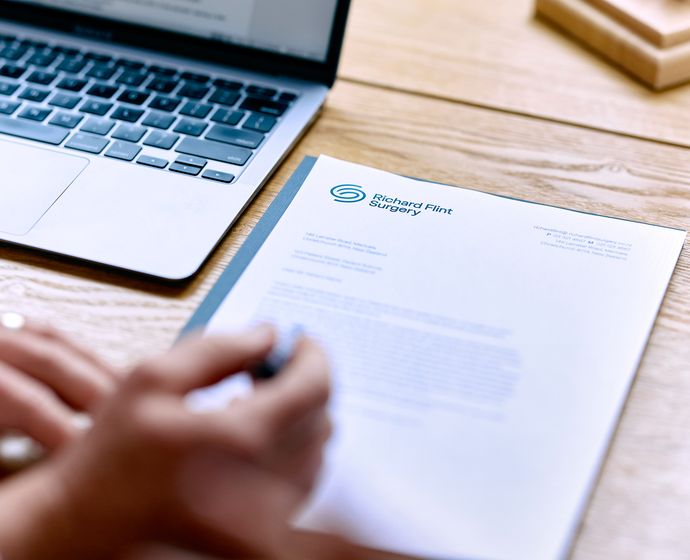Reflux surgery
Reflux surgery is performed laparoscopically. The first step is to repair the hiatus hernia by mobilizing the stomach back from the chest and suture-tightening the diaphragm around the oesophagus. The second step, called a fundoplication is to encircle the oesophagus with part of the stomach. This oesophagus can be encircled completely (called Nissen), or partially (Toupet or anterior) depending on the severity and pattern of symptoms.
Reflux surgery is best offered to those who can no longer control symptoms with lifestyle or medication. Proper patient selection is key to a good outcome, so preoperative testing is imperative. A gastroscope is necessary to confirm the diagnosis and on occasion a pH test and oesophageal manometry are required.

When to consider surgery for reflux
There are many treatment options your GP will likely consider before referring you for surgery, including antacids, proton pump inhibitors, or h2-receptor blockers.
However, if these treatments aren’t working, surgery might be the answer.
Fundoplication is the type of surgery performed to treat severe cases of GORD aiming to strengthen the lower oesophageal sphincter to prevent acid reflux.

Acid reflux
Click the section below to watch a video of a fundoplication performed laparoscopically and learn more about the surgery.

What to expect
- During your consultation We’ll review your medical history together and discuss the symptoms you’re having to help me determine the severity of the issue and the best course of action.
- After your consultation We’ll book you in for surgery and provide detailed pre-operation information and instructions to make sure you fully understand what to expect on the day of the surgery, including a detailed outline of your planned post-surgery care.
Reflux surgery, a pre-op and post-op guide
Days before surgery
Medication and supplements
Some medication will need to be withheld before surgery.
Bring your regular medications in their original packaging to the hospital, and follow instructions on which ones to take on the day of surgery.
Special considerations
Notify us if you develop a cough, infection, or any change in health in the week before surgery.
Arrange help at home for the first few days after surgery, especially for transportation, meals, and household tasks.
Plan not to drive for a week after surgery, so arrange for transport and assistance as needed.
It is normal to feel anxious. Bring something to help you relax, such as headphones, music, or a book.
The day before surgery
Shower or bathe the night before or morning of surgery.
Do not shave the surgical area; this will be done by the surgical team if needed.
Eat a light meal the evening before and avoid alcohol after 8pm.
Do not eat or drink anything after midnight unless instructed otherwise (some medications may be taken with a sip of water).
The day of surgery
Remove all jewellery, piercings, make-up, and nail polish before coming to the hospital.
Wear comfortable clothing and bring any hearing aids or glasses you may need.
You may wish to bring a friend or family member to accompany you and drive you home.
Arrive at the hospital at the specified time and bring all necessary paperwork and identification.
When do I arrive?
You will be required to arrive at the hospital a few hours before surgery so that the hospital staff can be prepared for the operation.
If you have a morning operation, arrive at the hospital at 7am. Do not have any food or drink after midnight prior (do not have breakfast).
If you have an afternoon operation, arrive at the hospital at 11am. Have your last Optifast no later than 8am and drink only water until 10am. Do not have anything after 10am.
For more information, download the reflux surgery guide below.
General recovery timeline
First week: Focus on rest, wound care, and gentle movement.
Two to four weeks: Gradually return to full activities.
Four to six weeks: Continue purée diet.
Wound care
Your wounds will usually have dissolving sutures and will be covered in a waterproof tape dressing. Keep your wound dry for the first 24 to 48 hours. After this period, you may shower, but avoid submerging the incision in water (baths, swimming) for 2 weeks.
Inspect the dressing after showering. The waterproof dressing may become wet or loose. If it happens, you may remove it, but try not to disturb the sticky plaster dressing underneath, which is adhered to the wound. This plaster normally falls off after about 2 weeks.
Do not apply ointments, antiseptics, or powders to the incision. Simply keep it clean and dry.
Monitor for signs of infection: Notify your surgical team if you notice excessive redness, drainage, swelling, or increasing pain at the incision area.
Pain relief
Take prescribed pain medication as directed. It’s normal to require medication for the first 1 to 2 weeks.
For more information about pain relief, get in touch or download the reflux surgery guide below.
Diet
It’s important to maintain a purée diet for 6 weeks following surgery. This is to allow the hiatal hernia repair and fundoplication to heal. Avoid any solid food. It could impact and disrupt the stitches during this time.
It’s common to feel nauseated and bloated in the first few weeks following surgery. Your stomach capacity will be reduced, and swelling at the surgery area may make swallowing feel tight.
After 6 weeks, you can start eating again, chewing slowly.
For more information about diet restrictions, get in touch or download the reflux surgery guide below.
Activity and mobility
Early movement is encouraged: get up and walk as soon as you are able, even on the day of surgery. Walking helps prevent blood clots, improves breathing, and speeds up recovery.
No absolute bed rest is needed; staying active helps your recovery.
You may resume driving when you can perform an emergency stop without pain, usually after 3 to 5 days.
Medications
Take your medications exactly as prescribed on your medication discharge instruction sheet. Unless otherwise directed by your doctor, all of your medications and vitamins can be swallowed as they are given. Alternatively you may crush tablets, use chewable or liquid forms.
For more information about medications, get in touch or download the reflux surgery guide below.
Contact Dr Flint at the rooms or your GP if you experience:
Fever above 38°C.
Increasing redness, swelling, or drainage from the incision.
Severe or worsening pain not relieved by medication.
Severe nausea and/or an inability to swallow.
P. 03 375 4480
For more information, download the reflux surgery guide below.
Patient information for reflux surgeries
Download our pre- and post-op patient guides for more information on what to expect during the process. Please note, these are general information brochures. When you are booked in for your surgery, you’ll receive any personalised information and details about your specific procedure.

Fundoplication recovery and diet guide
After your surgery, your stomach and oesophagus need time to heal. A puréed diet helps reduce discomfort, protect the repair, and support a smooth recovery.
In the first few weeks, swelling around the repair site can make swallowing feel tighter. If solid food is eaten too early, it can get stuck, causing pain or vomiting — and may risk damaging the repair.
At a glance:
- Day 1: Fluids only
- Day 2 to week 6: Puréed or soft foods
- After 6 weeks: Slowly return to your normal diet
For more information, download this fundoplication recovery and diet guide.
Day 1 - Start with liquids only. Sip slowly and stop as soon as you feel full.
What you can drink:
Water or diluted fruit juice
Tea, herbal tea, or coffee
Milk or hot chocolate (not too hot)
Clear soups (e.g. consommé, strained broth)
Nutritional drinks (e.g. Up & Go, Complan, Vitaplan)
Flat electrolyte drinks or cordial
Smooth fruit smoothies (milk/yoghurt blended with banana and tinned fruit)
Avoid:
Fizzy drinks (Coke, soda water, beer, kombucha)
Acidic drinks (undiluted juice, lemon drinks, tomato soup)
Very hot, icy cold, or spicy fluids
Straws or chewing gum
Day 2 to week 6 - Begin puréed foods.
Guidelines:
Food should be blended to a baby food texture. It shouldn’t contain any lumps and should be swallowed without needing to chew. Take small bites, eat slowly, and stop when you feel full. Try to eat soft, protein-rich food like eggs, yoghurt, fish, and cottage cheese.
Avoid (until after 6 weeks):
Bread, scones, muffins, pizza, cakes
Tough or dry meats
Raw vegetables and fruit with skins, seeds, or fibres
Popcorn, nuts, seeds, dried fruit, muesli
Cooked fibrous vegetables (e.g. cabbage, corn, beans)
As you approach 6 weeks and are tolerating purée well, you can slowly try foods that chew down easily — like soft casseroles, omelettes, etc.
After 6 weeks - Gradually reintroduce foods with normal textures into your diet.
You can try:
Soft breads, pasta, and rice
Moist meats (slow-cooked beef, chicken thighs, meatballs)
Lightly cooked vegetables
Peeled fruits
Toast with soft toppings
It’s normal to still feel some residual tightness, especially when swallowing certain foods. This tightness can persist for up to 12 weeks, as swelling continues to settle and scar tissue around the repair remodels. Start with smaller portions and avoid very dry or fibrous foods initially.
If you experience discomfort or food impaction at this stage, return to softer foods for a few days and try again.
Recovery can vary between individuals. Ongoing pain, frequent food impaction, or vomiting after this point should be reviewed by your surgical team.
It’s normal to feel tightness where the surgery was done, especially when swallowing. But if food feels stuck:
Stop eating immediately — do not try to force food down
Sit upright, stand up, or walk gently — gravity helps food move
Sip small amounts of room-temperature water
Try a few sips of fizzy drink (e.g. cola). The carbonic acid may help break down the food. Drink no more than 200 mL, and sip slowly
If the food passes down or is vomited back up and the pain resolves, the emergency has passed. Stick to fluids only for 2 days, then slowly return to puréed foods.
If pain continues even after food has cleared, seek medical advice.
Bloating is very common in the first few weeks after surgery because the stomach no longer refluxes, so gas doesn’t escape as easily. Gas-producing foods (beans, cabbage, onions, fizzy drinks) can worsen symptoms.
Tips to reduce bloating:
Eat slowly and chew well
Avoid fizzy drinks, straws, and chewing gum
Eat small, frequent meals
Stay upright for 30–60 minutes after eating
Gentle walking helps move gas
Most blockages settle within 30 minutes.
Seek urgent medical attention if symptoms last more than 2 hours and you:
Have food stuck in your lower oesophagus with pain and vomiting
Cannot swallow saliva or even small sips of water
Have already tried sitting upright, sipping water, a small amount of fizzy drink, and walking — with no improvement
Contact me or go directly to your nearest emergency department. You may need the food bolus to be removed with a gastroscope.

If you have unusual abdominal or bowel pain, I may be able to help.
Ask your GP to refer you to Richard Flint or get in touch with me to discuss your options.
FAQs
I am an independent surgeon, but I operate out of St George’s Hospital, one of Christchurch’s leading healthcare facilities. Enjoy comfortable surroundings and the support of dedicated nursing staff delivering quality care throughout your stay.
Reflux surgery usually requires a 1–2-night stay.
It depends on the type of medication. Here is a pre-op guide to find out more. If you have any doubt or further questions, don't hesitate to reach out to me or your GP.
Your stomach holds less because of swelling and the new wrap. Eat small meals and stop when full.
Swelling at the repair site narrows the passage. This usually improves by around 6 weeks.
Your stomach no longer refluxes, and gas can build up more easily. This is temporary and usually resolves with time.
One mild episode is unlikely to cause harm. Prolonged vomiting or the inability to swallow for more than 2 hours should be reviewed.
Yes. Some people can still burp small amounts. That’s completely normal and healthy. The goal of surgery is to stop reflux, not trap all gas.
Both are generally fine. If either causes bloating or discomfort, stop and try again after a week, in small amounts.
It’s common to feel reflux-like symptoms in the first 4–6 weeks after surgery, but this doesn’t usually mean the repair has failed. These symptoms are often not caused by acid. Instead, they result from swelling at the surgical site, which can temporarily affect how the lower oesophageal sphincter and diaphragm work together. This may slow down how the oesophagus clears swallowed air or fluids, which can sit above the wrap and feel like reflux.
In some cases, pressure from the stomach or pooling of saliva and secretions above the repair can also mimic heartburn. After years of reflux, the oesophagus can remain very sensitive, so even normal post-surgery sensations might feel like the old reflux. These symptoms usually settle as healing progresses.
Visit the FAQs if you have more questions, or get in touch with me for any other concerns.